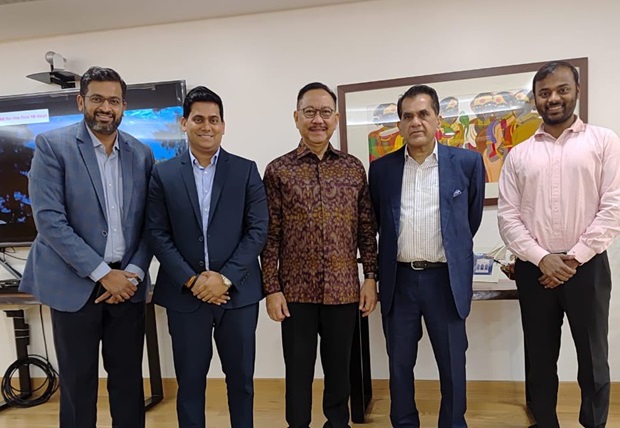Indonesian policy expert and Asian Development Leader Bambang Susantono engaged with Chakr Innovation, an Indian clean-tech company, to explore pioneering solutions for emission control. Chakr Innovation recently hosted Susantono, a former Chairman of Nusantara New Capital Authority and senior Indonesian bureaucrat, marking a significant step in India and Indonesia’s cooperation through policy dialogue and knowledge exchange.
During his visit, Susantono gained insights into India’s innovative approaches to addressing environmental challenges, particularly in combating air pollution. The technology-focused discussions brought together many key thought leaders.
“I extend my heartfelt appreciation to Bambang Susantono for his visit to India. This important trip not only highlights the socio-economic ties between India and Indonesia but also paves the way for a mutual exchange of knowledge and resources. By exploring our strengths and shared challenges, we can develop effective strategies to combat air pollution, setting a benchmark for the globe. Susantono’s presence is a testament to our strong bilateral ties and an invaluable opportunity for collaboration. I am optimistic that this visit will foster deeper interactions and lead to impactful initiatives for both India and Indonesia,” said Sandeep Chakravorty, Indian Ambassador to Jakarta.”
During his meeting with Susantono, Amitabh Kant, former CEO of NITI Aayog, underscored India’s growing influence as a soft power in climate action, emphasizing how culture, political values, and foreign policies intertwine to shape this impact.
“India’s young entrepreneurs are harnessing technology to create transformational solutions that resonate with our rich cultural heritage and democratic ideals. This innovative spirit positions India as a beacon of soft power in global sustainability efforts,” he noted. Kant highlighted that technologies like Chakr Innovation’s emission control systems exemplify how India can leverage its robust manufacturing capabilities and progressive foreign policies to expand into Southeast Asia and other global markets.
“Our vision of ‘Viksit Bharat’ aligns with enhancing exports, fostering regional collaborations, and showcasing India’s commitment to sustainability, all of which reflect our core values of inclusivity and partnership,” he added.
“Startups today are not merely solving problems; they are building ecosystems that merge innovation with purpose. Cleantech pioneers like Chakr Innovation are demonstrating how technological agility and a mission-driven approach can lead to scalable, impactful solutions for a cleaner future. As India and Southeast Asia deepen their collaboration, these innovative ventures have the potential to set global benchmarks, influencing policy and creating commercially viable, sustainable models that inspire change at scale,” said Sanjeev Bikchandani, founder and executive vice chairman of Info Edge.
“I am truly honored to engage with Chakr Innovation and to meet esteemed Indian bureaucrats and business leaders during my visit. Our discussions highlighted the innovative strategies and effective policies that India has implemented in its fight against air pollution. By sharing our insights and experiences, we can enhance our collaborative efforts in clean technology and develop impactful solutions tailored to our unique challenges. This partnership signifies not only a commitment to sustainability but also an opportunity to set global benchmarks in environmental stewardship. Together, Indonesia and India can lead the way toward a cleaner, greener future that benefits not only our nations but also the world at large,” stated Mr. Bambang Susantono.
Kushagra Srivastava, CEO of Chakr Innovation, emphasized the strategic importance of such technical exchanges. “We are honored to demonstrate India’s leadership in clean-tech solutions. Such focused interactions with experienced international policy experts help identify pathways for scaling impactful technologies across similar economies,” he stated. This technology exchange highlights the parallel environmental challenges faced by rapidly developing economies like India and Indonesia, particularly in managing emissions from vehicles, industries, and urban growth. Through targeted technical exchanges, innovative solutions can find wider application across growing markets, contributing to global sustainability goals while opening new business horizons.

